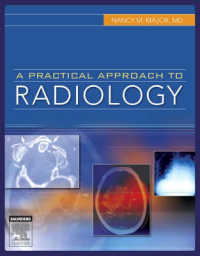- ホーム
- > 洋書
- > 英文書
- > Religion / Ethics
Full Description
This volume offers an appreciation of the value of intertextuality—from Greek, Roman, Jewish, and biblical traditions—as related to the post-apostolic level of Christian development within the second century. Not least of these foundational pillars is the certain impact of the Second Sophistic movement during this period with its insipient influence on much of early Christian theology's formation. The variety of these strands of inspiration created a tapestry of many diverse elements that came to shape the second-century Christian situation. Here one sees biblical texts at work, Jewish and Greek foundations at play, and interaction among patristic authors as they seek to reconcile their competing perspectives on what it meant to be "Christian" within the contemporary context.
Contents
The Wisdom of Sirach and the Glue of the Matthew-Didache Tradition
Clayton N. Jefford
2 Clement and the New Testament
Christopher Tuckett
Intertextual Relationships of Papias' Gospel Traditions: The Case of Irenaeus, Haer. 5.33.3-4
Richard Bauckham
Intertextual Death: Socrates, Jesus, and Polycarp of Smyrna
Michael W. Holmes
Ignatius of Antioch in Second Century, Asia Minor
Allen Brent
A Riddle Wrapped in an Enigma: Pauline Reception in the Antiochene Acts of Ignatius
Candida R. Moss
1 Corinthians 2:9 in the Apostolic Fathers
Paul Hartog
Melito of Sardis's Peri Pascha and Its Intertextuality
Lynn H. Cohick
From Justin to Athenagoras
Mark Edwards
Reading Martyrdom: Intertextuality in the Letter from Vienne and Lyons
D. Jeffrey Bingham
Scripture and Gospel: Intertextuality in Irenaeus
John Behr
The Demonstration of Intertextuality in Irenaeus of Lyons
Stephen O. Presley
Bibliography
Index of Ancient Sources








